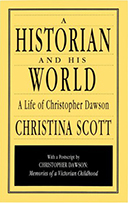Christopher Dawson was born in Hay Castle on the Welsh Borders in 1889 and died in Budleigh Salterton, Devon in 1970. He was married to Valery Mills and had three children – Juliana, Christina and Philip.
Educated at Winchester and Trinity College, Oxford, where he studied Modern History, he went on to pursue a career as an independent historian, ‘ploughing a lonely furrow’ and only publishing his first book at the age of 40. He lectured at the University of Exeter, wrote articles for academic journals and, as his books began to be published, gained increasing recognition as a historian of religion and culture. The zenith of his career came with his appointment to the Chauncey Stillman Chair of Roman Catholic Studies at Harvard in 1958. After four years in the post, he had a series of strokes which forced him to return to England, where he lived until his death in 1970.
Although Dawson was psychologically introverted, he was always passionately interested in the events taking place in the world around him. It was as if, like the true historian that he was, he was watching the unfolding of history before his eyes. This can be seen in his whole approach to history, in which he draws frequent parallels between the past and the present.
His family background was like an open door into the past: his mother was not only a local historian, but also belonged to a Welsh family that traced its origins back to the Middle Ages. Christopher’s ancestors on his father’s side included soldiers, clergymen, yeoman farmers and wealthy merchants, several of whom kept journals and wrote letters still in the family’s possession. History was in his blood, as well as in his mind and imagination.
Dawson moved mostly in a circle of Catholic intellectuals – his closest friend E.I. Watkin, his publishers Frank Sheed and Maisie Ward, David Jones, Ronald Knox, Algar Thorold and Bernard Wall, amongst others. He was also on friendly terms with Arnold Toynbee and C.S. Lewis and was much admired by T.S. Eliot, who, towards the end of his life, called him the most influential writer in England.
Some of his correspondence with fellow Catholics, critics of his works and other correspondents, survives and is held in the Christopher Dawson Collection at the University of St. Thomas, USA.


